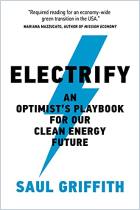Rejoignez getAbstract pour lire le résumé !

Rejoignez getAbstract pour lire le résumé !
Marco Alverà
The Hydrogen Revolution
A Blueprint for the Future of Clean Energy
Basic Books, 2021
Aperçu
Hydrogen could bring global CO2 emissions to zero.
Recommendation
Renewable energy, such as solar and wind power, has made great progress – but it cannot eliminate the world’s carbon emissions. However, in partnership with hydrogen, it might. Hydrogen is the simplest and most prevalent element in the universe. It can store the electricity that renewable sources generate, and pipelines could transport it great distances, bringing abundant and cheap renewable energy to where it is needed when it is needed. In this passionate, clear and science-based call to action, energy executive Marco Alverà discusses the technical and economic challenges of making hydrogen a feasible energy option.
Summary
About the Author
Marco Alverà is the Co-Founder of Zhero and CEO of TES, two renewable energy companies that are accelerating the global energy transition. He has more than 20 years of experience in Europe’s largest energy companies, notably as CEO at Snam and in senior positions at Eni and Enel.



















Comment on this summary